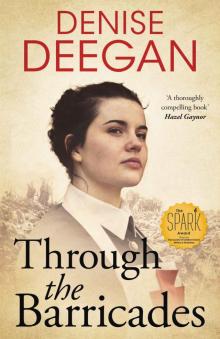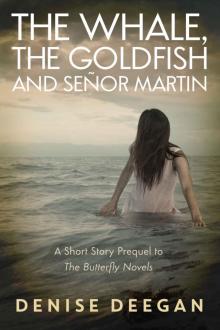- Home
- Denise Deegan
Do You Want What I Want?
Do You Want What I Want? Read online
Do You Want Wha I Want?
Denise Deegan lives in Dublin with her husband and two children. Do You Want What I Want? is her fourth novel.
Do You Want What I Want?
DENISE DEEGAN
PENGUIN
IRELAND
PENGUIN IRELAND
Published by the Penguin Group
Penguin Ireland, 25 St Stephen’s Green, Dublin 2, Ireland (a division of Penguin Books Ltd)
Penguin Books Ltd, 80 Strand, London WC2R 0RL, England
Penguin Group (USA) Inc., 375 Hudson Street, New York, New York 10014, USA
Penguin Group (Australia), 250 Camberwell Road, Camberwell, Victoria 3124, Australia
(a division of Pearson Australia Group Pty Ltd)
Penguin Group (Canada), 90 Eglinton Avenue East, Suite 700, Toronto, Ontario, Canada M4P 2Y3
(a division of Pearson Penguin Canada Inc.)
Penguin Books India Pvt Ltd, 11 Community Centre, Panchsheel Park, New Delhi – 110 017, India
Penguin Group (NZ), 67 Apollo Drive, Rosedale, North Shore 0632, New Zealand
(a division of Pearson New Zealand Ltd)
Penguin Books (South Africa) (Pty) Ltd, 24 Sturdee Avenue, Rosebank, Johannesburg 2196, South Africa
Penguin Books Ltd, Registered Offices: 80 Strand, London WC2R 0RL, England
www.penguin.com
First published 2007
I
Copyright © Denise Deegan, 2007
The moral right of the author has been asserted
All rights reserved
Without limiting the rights under copyright
reserved above, no part of this publication may be
reproduced, stored in or introduced into a retrieval system,
or transmitted, in any form or by any means (electronic, mechanical,
photocopying, recording or otherwise), without the prior
written permission of both the copyright owner and
the above publisher of this book
A CIP catalogue record for this book is available from the British Library
EISBN: 978–0–141–90133–6
To Joe, at last
1
Rory skids his Alfa Romeo to a halt outside the church.
‘Will you park it, Lou?’ he asks his girlfriend. ‘It’ll have started.’
‘Yeah, go,’ she says, sliding into the driver seat.
He runs towards the church, coat flapping. He checks his watch again. Twenty minutes late. He could slip in at the back. If he weren’t godfather, part of the ceremony, noticeable. His sister has surprised him with this responsibility and already he’s letting her down. Reaching the door, he tells himself it’s Ireland – everything starts late. It’ll be fine.
Inside, he realizes it’s not.
The congregation has settled and the priest is at the altar. Rory does a quick scan. There seems to be more than one christening. Where is his sister? Where’s Siofra? The back of the church is empty. He starts to walk up the aisle, eyes skimming the crowd ahead. At last he sees the back of a familiar head, its white hair thick and wiry, cut short as though to tame it. Rory tenses – as he always does in the presence of his father. He would be on time, Rory thinks. Twenty minutes early, probably.
He spots Siofra in the row in front. Beside her is her husband, Tony. Did they have to sit right at the top of the church?
Head down, in an effort to make himself less conspicuous (impossible given his height), Rory goes to join them.
Heads turn.
Not soon enough, he gets to the top.
Siofra, visibly relieved to see him, hooches in.
‘Sorry,’ he whispers. Looking to her right, he raises a hand to greet Tony. His brother-in-law is holding Daisy, the baby. Rory leans in to see her. She may be his godchild but she is a stranger to him. Last time he saw her was three months ago when he’d made the obligatory trip to the hospital after her birth. She’s cute – as babies go. Rory smiles at his nephew, Alex, who seems to have grown a lot since he last saw him. He must be what, two, three? Three. Definitely. Blond curls, blue eyes, navy round-necked pullover, white shirt and striped scarf, he is a cross between a Harvard preppie and an angel. Beside him is Rory’s sister-in-law, Orla. Given her location in the front row, Rory assumes that she must be godmother. He is surprised. Siofra and Orla have always been close, but won’t this be awkward? It certainly is for him. Since Orla and his brother Owen separated, a year and a half ago, Rory has made no effort to keep in touch with her. They used to be close.
Orla looks in his direction, catching him by surprise. His reaction is to raise an apologetic hand. Her smile is warm, as though nothing has changed between them. Guilty, Rory turns to face the altar. The priest is baby-faced with long hair and Jesus sandals. A knitted scarf in Rastafarian colours hangs brightly down on either side of his neck, a refreshing adaptation of priestly attire. Rory knows what his conservative father must think of that. And develops an instant fondness for the cleric. His thoughts turn to Louise, who he hopes has found a parking space and by now a seat. He’d like to turn around and check, but is conscious of his father behind him, already fuming, no doubt, about his late arrival – disturbing the congregation, disrespecting God. To look back now would drive him over the edge. To hell with him, Rory decides – at thirty-six, he is too old to care what his father thinks. And yet, he doesn’t turn around.
The priest asks parents and godparents to make their way to the back of the church. Rory’s ‘old man’ thinks there are too many gimmicks in modern religious ceremonies, and, for once, Rory finds himself in agreement. Why the need to jump through hoops? Can’t they just get on with it? The spotlight has never held any attraction for Rory. At school plays, group photographs, he has always found room at the back. Halfway down the aisle, he spots Louise and brightens. He winks at her. And she returns it. She’s looking great. At thirty-eight, she could be twenty-five, in that fitted black shirt he loves, and matching trousers she bought in LA that grip her ass and legs. As for the knee-high boots? Rory has always had a soft spot for them.
In the last pew, he catches sight of his brother, Owen. He is alone. Which is both unusual and a relief. Rory wonders why he came at all. A good excuse would have made it easier for everyone. That’s what Rory would have done.
They take their seats again. And the ceremony continues. Rory has to hand it to the priest. His laid-back approach has him listening. When he mentions The Exorcist though, Rory thinks he may have gone too far. He imagines his father, apoplectic behind him, and wonders if you can tip men of the cloth.
The ceremony, as far as Rory can tell, goes well. No crying or dropped babies. No catastrophes generally. There is the startling issue of his godfatherly duties as outlined by Father Groovy – to make sure that Daisy is brought up in the Christian faith – but Rory doubts that anyone will hold him to it. Modern Ireland being what it is, godparenting, he gathers, is mostly about presents. Siofra and Tony are great parents. There’s no place for Rory to become as involved in Daisy’s life as his own godfather was in his. If she’d been a boy, maybe there would have been other ways to play a role – the odd game of rugby, a pint at eighteen – but the fact is Daisy is a girl. And Rory wouldn’t know what to do with a girl.
Then the christening is over. Done. Painless enough, after all.
In unfortunate familial co-ordination, Rory and his father, Declan, step out onto the aisle at the same time. Their eyes meet. Rory raises his chin in greeting. Eye contact seems the best Declan can do. Rory stands back to let everyone out ahead of him, creating a welcome distance between himself and his old man. His mother, when she sees him, gives a little wave. She is loving all this, the fuss, the glamour, meeting her
family, revelling in the day out. A rare stab of guilt hits Rory. He should put more effort in, go further than just showing up at family celebrations – births, fortieth birthday parties, christenings. But then he looks at the back of his father’s head and is reminded of why he doesn’t.
Outside the church, he scans the crowd for Louise. And finds her talking to Orla’s teenage daughter, Jenna. When the hell did she get so grown up? She looks eighteen. But couldn’t be. Last time he saw her, a year and a half ago, she was still a kid. With her is a boy of about eight whom Rory doesn’t recognize. He remembers hearing something about Orla taking in a foster kid. Must be him. Lean and wiry, with alert eyes and cropped hair, he is a stark contrast to Rory’s dimpled nephew. He looks like he might dart away at a second’s notice.
‘Hey, Jenna,’ Rory says to his niece. ‘Who’s this?’
‘Jason,’ she says.
‘The foster kid,’ the boy says, as though to cut short further discussion on the subject.
‘Hi,’ Rory says to him. And makes a point of adding, ‘Nice to meet you.’
The boy just looks at him. Expressionless.
Rory runs a finger inside his shirt collar. ‘Have you got the present?’ he asks Louise.
‘In the car. I thought we’d give it to Siofra at the party.’
He nods. ‘Good idea.’
Orla and Siofra join them. Unfortunately for Rory, his parents also seem to be on their way over, not that he has a problem with his mother.
Louise slips an arm around him.
June, his mum, comments on how well-behaved the children were in the church.
‘What did you think of the priest?’ Orla asks, smiling.
Declan’s face is thunderous when he addresses Siofra. ‘That wasn’t the only bad choice you made.’ He turns to Rory. ‘Couldn’t you have got here on time? Was that too much to expect?’
Louise tightens her arm around Rory in support. But he doesn’t feel it. What he feels is sick. He’d been chuffed at this godfather thing. Had wanted to do it right. He’d got up early, been in plenty of time, even checked out where the church was in advance. Had it all sorted. Then he’d received an urgent call from the hospital and had to go in. One of his patients, an elderly man with a condition called Myasthenia Gravis, had gone into crisis. It was a medical emergency. Couldn’t be helped. But he’s not about to excuse himself to his father. Fuck him.
‘I apologized to Siofra. I think you’ll find that’s the relevant person.’ Taking Louise’s hand, he turns and walks away from his family, making for the gates of the church. ‘Let’s get out of here,’ he says.
‘What about the christening party?’
‘What about it?’
‘We have to go. For Siofra.’ She looks back at his father. ‘Ignore him.’
‘I spend my life ignoring him.’
‘So you’ve plenty of practice,’ she smiles, linking his arm. ‘Come on.’ She bumps his hip with the side of hers. ‘We’ll slag his hair – Cauliflower Head.’
‘We’re not staying long,’ he says, still moody.
‘We don’t have to. Just make an appearance.’
That is something he has perfected.
The Dublin property market is responsible for many things – making multi-millionaires; changing post offices, petrol stations, garden centres into apartment blocks; parents remortgaging their homes so their grown-up children can afford to buy. It is also responsible for more subtle developments, such as the October barbecue. Siofra and Tony’s house is too small to entertain everyone indoors, so the reception is outside under two giant heaters. Lanterns and fairy lights decorate an area estate agents would optimistically describe as a ‘courtyard’.
Rory goes inside to get drinks. He’s at the fridge when Siofra, holding Daisy, comes over to him.
‘How’re you doing?’ she asks.
He closes the door. ‘I’m OK.’
‘Don’t mind him,’ she says. ‘You’ll be a great godfather.’
‘Yeah.’ It’s not that that bothers him as much as the feeling that no matter what he does he will always be a disappointment to his father.
‘Would you like to hold her?’ Siofra asks.
Rory feels he should – to prove something. But she seems so small. Vulnerable. What if he drops her? He moves closer but instead of taking her, bends over her, bringing his face up to hers and raising his eyebrows, smiling and waving three fingers.
‘Hello, Daisy,’ he says. ‘Hello. This is your uncle Rory.’
‘Daisy, meet the man who’s going to bring you up in the Christian faith,’ Siofra jokes. She looks at her brother. ‘Go on, take her.’ She holds the baby out to him.
‘Eh, maybe later.’ As in, five years.
‘What are you afraid of?’ she asks.
‘I’m not afraid.’
‘You’re a doctor.’
‘So?’ Why does everyone assume doctors are good with kids? Why do they assume doctors are good, full stop?
She shakes her head as if to say, ‘You’re hopeless.’ He hates it when she does that. Wants to tell her that they’re not kids any more. They’re equal now. The pecking order no longer exists. But to do that would mean confrontation, something Rory has always avoided. So, he quietly fumes. Why did she ask him to be godfather if she thinks he’s such a goddamn idiot?
‘Louise is waiting on a drink,’ he says, to get away. ‘Back in a sec.’
‘Yeah, right,’ she says, smirking.
That she knows him so well annoys him even more.
He heads back out to Louise. Passing his parents, he overhears his father.
‘Sit down, June, we’re old.’
‘Speak for yourself,’ she replies. But with a smile.
Rory smiles himself. She always was the one person who could handle him.
He finds Louise where he left her, standing directly under a heater, smoking, and listening to a well-dressed man in his fifties Rory has never met.
‘I bought at four hundred thou in ’94,’ he’s saying. ‘Worth at least two point five mill now.’ Another property market success story Rory does not want to hear. He hands Louise her drink and is about to make a quick exit, when she takes his arm and introduces him. The man is an uncle of Tony’s. ‘Of course, all the sensible money’s going offshore now,’ he continues, as though there is no doubt that Rory will be interested in the conversation. ‘The bargains you can get in Croatia and Turkey…’
This is not the first person Rory has met who thinks he is a financial wizard because he had the good fortune to buy property at the right time.
‘Have you bought anything over there yourself?’ Louise asks.
‘Me? No. I zig when the market’s zagging. Berlin’s the place to buy.’ He taps the side of his nose. ‘Market’s in the doldrums. As I always say – buy when there’s blood on the streets.’
Jesus, Rory thinks.
‘You can snap up a block of apartments for a mill. Sure, you wouldn’t get a decent three-bed semi in Dalkey for that.’
Rory looks at Louise. She crosses her eyes at him. And he relaxes a little. Property market conversations always stress him out. He looks at Tony’s uncle, waiting for The Question.
Inevitably, it comes: ‘So, where have you bought yourselves?’
Rory lets Louise handle it.
‘We’re renting,’ she says. ‘I’ve just started a business…’
‘Oh, really, what?’ asks the uncle.
There was a time when Irish people didn’t demand the details of your life, Rory thinks.
‘A florist shop,’ Louise says.
‘Riiight,’ he nods. When he starts to offer his expertise on the subject, Rory excuses himself. It’s always the same with these property hotshots. Once they discover that he hasn’t bought in, they look at him like he’s a loser, too tight or too skint to pony up the exorbitant prices demanded in this town. He wonders how they would handle his predicament, how they would approach buying property if they were living with som
eone they weren’t committed to for life? Whichever way you look at it, sharing a mortgage is making a statement, a statement neither he nor Louise wants to make. Yes, he could buy a place independently (somewhere tiny on the outskirts of the city), but that would be making a statement too. He might not want to promise himself to Louise for life, but he can’t imagine living without her either. In any case, who’d have guessed prices would have gone this crazy? Buying now would be a risk. What if it all came crashing down? Mind you, he has thought that for years.
He catches sight of the foster kid – Jake? Jason? – pocketing something from the table. Surprised and curious, he goes over, hands in his own pockets. Casual.
‘Hi!’ he says.
The boy eyes him warily. Says nothing.
‘So, Jake, how’s it going?’
‘Jason.’
‘Sorry, of course, Jason. What are you up to?’
‘Nothing.’
‘Good food, eh?’
Jason shrugs and looks back at the table, as if expecting Rory to go about his business.
‘You play soccer?’ Rory asks.
The boy seems surprised that he’s still there. ‘No.’
‘Rugby?’
He looks Rory up and down. ‘Rugby’s for ponces.’
Rory tries not to laugh. ‘Is that so?’
‘Yeah.’
‘So what do you play?’ Rory asks.
‘Nothing.’
‘Just eat, right?’
‘What do you want?’
‘To talk to you.’
‘Why?’ Suspicious.
‘Because, for one thing, you’re not going to talk about property.’
The boy cocks his head. ‘Who says? I know lots about property.’
‘Oh?’ Rory can’t help smiling. ‘What?’
‘Lots.’
‘Give me an example.’
‘OK.’ He sniffs, puts down the burger he has just picked up. ‘If you’re selling your house, right, and if you’ve two double bedrooms…’
‘Double bedrooms?’ Rory wonders where the kid learned that term.

 The Butterfly Novels Box Set: Contemporary YA Series (And By The Way; And For Your Information; And Actually)
The Butterfly Novels Box Set: Contemporary YA Series (And By The Way; And For Your Information; And Actually) Do You Want What I Want?
Do You Want What I Want? Through The Barricades: Winner of the SCBWI SPARK Award 2017
Through The Barricades: Winner of the SCBWI SPARK Award 2017 The Whale, The Goldfish and Señor Martin: A Short Story Prequel to The Butterfly Novels
The Whale, The Goldfish and Señor Martin: A Short Story Prequel to The Butterfly Novels